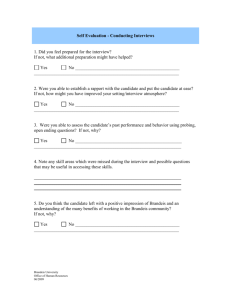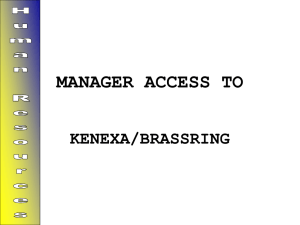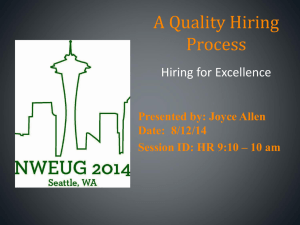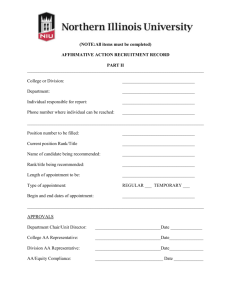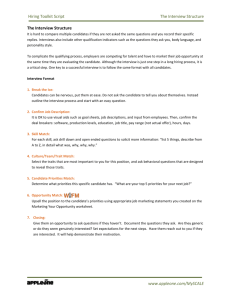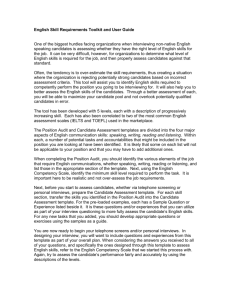POWER Hiring - Gary Forster
advertisement
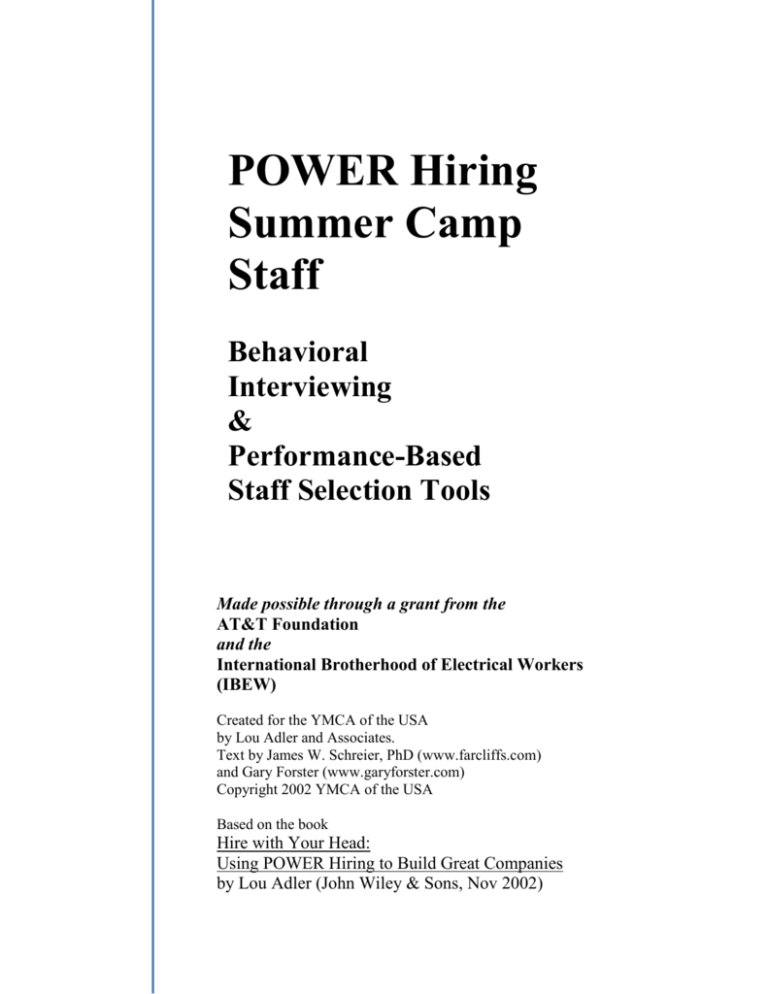
POWER Hiring Summer Camp Staff Behavioral Interviewing & Performance-Based Staff Selection Tools Made possible through a grant from the AT&T Foundation and the International Brotherhood of Electrical Workers (IBEW) Created for the YMCA of the USA by Lou Adler and Associates. Text by James W. Schreier, PhD (www.farcliffs.com) and Gary Forster (www.garyforster.com) Copyright 2002 YMCA of the USA Based on the book Hire with Your Head: Using POWER Hiring to Build Great Companies by Lou Adler (John Wiley & Sons, Nov 2002) INTRODUCTION “About 85 percent of the typical job interview has to do with technical competence, but 70 percent of the hiring decision is based upon personal chemistry—a like or dislike reaction that takes place within just a few minutes of the encounter.” —Donald D. DeCamp in the American Management Association Management Review What Makes a POWER Hiring Interview Different? What are the attributes we usually value when interviewing a candidate? Usually, they are the four As: is he or she assertive, affable, articulate, and does he or she have a good appearance? Those are things that help any candidate get a job. But when it comes to actually doing the job, we grade employees on a different scale: self-motivation and drive, competence, teamwork and management skills, and most of all, results. In the standard job interview, emotions tend to dominate our decisions because of the power that first impressions have (that list of the four As). Some estimate that 80 to 90 percent of hiring decisions are based on these superficial attributes and that only 20 percent are based on the candidate’s potential for succeeding in the job. There are several internal problems in our current system: We naturally tend to overvalue style and don’t have the interviewing skills to seek out substance. Most interviewers don’t have a clear idea of the skills, experiences, and attributes that actually produce success in a given job. Good interviewees aren’t necessarily good camp counselors, so too frequently we hire people who can’t do the job. Good candidates aren’t always good interviewees, so we incorrectly reject people that could do the job successfully! Some research studies suggest that, as a result, the typical interview is only 57 percent accurate. That is, it’s only 7 percent better than flipping a coin! People who get it right know the job they’re hiring for and proactively can break free from the emotional pull of first impressions. If you don’t know the job, you substitute your perceptions of the job. That’s why different people interviewing the same candidate have different assessments. They value different things. That’s why we first created the Performance Profile (page 9) to pick just those things a great camp counselor will be required to do. Creating this profile would be your first step in hiring for any other position, too. If you want to hire superior people, first define superior performance. This is the first and most important principle of POWER Hiring. Some say that typical interviews are only a little more accurate than flipping a coin. Through a series of interviews at YMCA camps across the country, POWER Hiring created a Performance Profile for the camp counselor position. All the other hiring tools in the packet are based on this profile. It describes superior performance for a great camp counselor. Take a moment to read it before each interview so that you have the key performance objectives in your mind as you interview and assess an applicant. The whole purpose of the interview is to discover if a candidate is capable of delivering the desired results described in the profile. Now that we know exactly what it is we want in a great counselor, how do we find out if a candidate has it? Traditionally, we’ve asked hypothetical questions such as, “What would you do if you had a homesick camper?” These require the candidate to guess what he or she thinks © YMCA of the USA -- Made possible by a grant of the AT&T Foundation and IBEW Page 2 +7 % we want to hear and completely make up an answer. Wouldn’t it be better if we could get the candidate to describe a situation where he or she had to solve a similar, but not necessarily identical, problem in the past? After all, past performance is by far the best predictor of future performance. Isn’t that what we use to decide which counselors to invite back for next year? The Most Important Interview Question of All Time There’s one question that beats all others in revealing the habits, character, and skills of any candidate: “Can you tell me about an accomplishment you’re very proud of?” The candidate’s first answer may be a single sentence. That’s when you go deeper by asking, “That sounds interesting; could you tell me more about that?” When the candidate starts to describe the actual accomplishment, he or she worries less about giving you the right “hypothetical” answer and gets comfortable in reliving the facts and details of these positive memories. Your role is to help keep the candidate on track by showing your sincere interest in the story and encouraging more details. You’ll get to know your applicants as real people, and they’ll know you actually care about who they really are, and not about how they answer of a long list of tricky questions. Here’s how to do it: 1. Obtain as much information as you can about the candidate’s most significant accomplishment. This reveals competency, character, personality, ability to learn, team skills, the ability to accomplish results, pace, attitude, capability, and potential. 2. The best candidates aren’t necessarily going to provide this information without prompting. You’ll have to teach most candidates that you’re looking for actual examples and not the simple one-line answers they’ve given at other interviews. “This could be at college, in high school, in your family, or in a youth group…” You as the interviewer must take responsibility to obtain the information. Otherwise, you’re measuring interviewing skills, not job competency. 3. Motivation is the key. You want to know why the candidates excelled in the example chosen. What they did or didn’t learn from the event will help identify trends. 4. The key for every question of this type is to obtain the results achieved, the process used to achieve the results, and a good understanding of the environment in which they took place, including resources, pace, time, and sophistication. Don’t let the candidates describe their accomplishments from “a 30,000-foot view.” Get low to the ground and probe to find out exactly what actions were theirs and what actions actually were the results of others. A single good accomplishment could take you on a 10minute tour of candidates’ abilities once you “fact find” to get deeper. But if their first accomplishments don’t yield much information, don’t get discouraged… © YMCA of the USA -- Made possible by a grant of the AT&T Foundation and IBEW Page 3 The Most Important Question of All—Times Three The question was great the first time, so why not try it again? Once you’ve found a solid accomplishment and followed it for 5 to 10 minutes for details, ask it again: “I’d love to hear more. Can you give me another example of an accomplishment?” After journeying into the details of another illustration of accomplishments and skills, ask for a third case, steering for information you may not yet have heard. 1. During the course of the interview, you’ll try to obtain this for an individual accomplishment, team accomplishments, and those accomplishments that relate to real job needs as described in the Performance Profile. 2. Evaluate the trend of talent, energy, and leadership over several years to view growth. If you hear something that sounds an alarm, find out if the candidate has grown from that experience or still sees it the same way. 3. Sometimes candidates won’t give the best answers until they’ve been “taught” how. This doesn’t mean describing themselves in a way they think will lead to a job, it means learning that you’re looking for details about their own past actions—what they actually accomplished and how—and not some hypothetical “would do” in the future. Fact-Finding—The Real Key to Interviewing Accuracy Narrow and deep is better than broad and shallow. We want the candidate to paint a word picture of each accomplishment—the planned results, the actual results, the process used to achieve the results, and the environment in which the results occurred. “Can you give me an example of the exact role you played?” This is the best way to get a glimpse of the candidate at work. Most initial responses are too general, and candidates sometimes exaggerate. Getting examples is the best way to understand a specific accomplishment. Good candidates quickly relax with this technique. Candidates who are good presenters, but weak on substance, get nervous. The YMCA Camp Counselor Interview (see page 12) that has been prepared for you here is formatted in a very special way to aid you in fact-finding. For each section, the initial topic of each openended question is printed in bold type. Along the right-hand side you’ll find a series of follow-up questions for fact-finding. You won’t use every one, but you will pick and check off those that help you dig deeper into their accomplishments. We call that “peeling the onion.” A great way to get started is to tell your candidate: “Getting the right people hired as camp counselors for our camp is the most important thing we do. I know this interview is important to you, too, so I hope you won’t mind if I actually read some of the questions to make sure you get the best interview possible? I’ll be taking notes while we talk, too. Will that be alright?” © YMCA of the USA -- Made possible by a grant of the AT&T Foundation and IBEW Page 4 Note-Taking Make sure to take good, useful notes during the interview. Tell candidates up front that you’ll be taking notes, and start taking notes right away. It alleviates their fears and prevents anxiety when you suddenly reach for the pen. Your notes should help you defend your decision to hire or not hire a candidate. You will want to include specific examples of accomplishments and not note your “feelings” about a candidate. Focus on what he or she actually did. Make sure to transfer your notes to the bottom of the 10-Factor Candidate Assessment form. All notes should validate your final assessment of the candidate and should be consistent. If you can fill a page with notes about a candidate’s accomplishments, you know you’ve done enough fact-finding. A model practice is to print enough copies of the Camp Counselor Interview so you have a clean one for making notes on each candidate. By checking off the questions you ask and making notes on the specific accomplishments you fact-find, you’ll be able to circle a numeric score after each question. Once the interview is complete, you can take just a couple of minutes to transfer your findings onto the 10-Factor Candidate Assessment form and come up with a numeric score. You’ll use it to evaluate the candidates’ fit for the job, compare candidates, and compare your candidates with those interviewed by other staff members from your organization. A Problem-Solving Question But don’t throw out all of your old “what if” interview questions! Throughout the interview you’ve let the candidate describe actual events that show us how he or she might meet our performance standards, including building one-on-one relationships, playfulness, managing stress, and values and integrity. The candidate has gotten used to giving you real-life examples. Later in the interview, you can ask a question that gets the candidate to show how he or she might think on his or her feet and see some thought processes and flexibility. The POWER Hiring Formula—Performance First, Then Personality! For all positions—but especially the camp counselor position—personality, character, and fit are all critical factors for success. However, you must measure performance first. Clearly defining performance objectives and asking the best questions won’t be effective unless you control your emotions and gut reactions. This is the number one cause of hiring mistakes! Here’s just one tip that will make a world of difference: Wait at least 30 minutes into the interview before making any judgment about the candidate’s fit for the position! Here’s why you should wait: Some say the traditional interview actually is not much better than a simple coin toss for selecting a good employee. Yet people boast that they can tell in an instant if a candidate is a good fit or not. This kind of arrogance often leads to rejecting good candidates while accepting articulate and amiable, but often less competent, candidates. Why wait 30 minutes? It’s psychological! If you immediately have a good rapport with the person—he or she is clean cut, articulate, and friendly—you end up asking easier questions and not probing as deeply. You may let things slide and give the candidate the benefit of the doubt. On the other hand, if you immediately dislike the person based on appearance or mannerisms, you will end up being negative, asking harder questions, cutting the interview short, and not really listening to the candidate’s responses. Learn to control your emotions. © YMCA of the USA -- Made possible by a grant of the AT&T Foundation and IBEW Page 5 Measure performance first and wait 30 minutes before making any hiring decision, and you’ll eliminate many hiring mistakes. There are instructions throughout the interview guide that will help you remain objective and control your emotions. If you follow the guide, your hiring will be much more effective. Here are some tips: Force yourself to remain objective. Once you decide on the candidate’s competency, the assessment process stops. If this happens within the first 30 minutes of the interview, you’ll never have enough data to draw a valid conclusion. Don’t spend more than two or three minutes describing your camp at the beginning of the interview. Start asking questions right away. Don’t feel compelled to editorialize or comment about your reactions or feelings. Listen four times more than you talk. We all talk too much. We do not learn anything while we talk. It’s better to ask questions. Interviewing is a fact-finding exercise, not a social conversation. The key to emotional control is recognition. Write down the two or three things that turn you on and off about candidates when you first meet them. Be conscious of these during the interview. Fight the urge to decide too soon. By bringing these emotional triggers to a level of awareness, you can offset their negative impact. Keep track of when during the interview you begin deciding. Fight the urge to decide for at least 30 minutes. Recruiting Is Marketing, Not Selling Getting the candidate to say “yes” is the critical part of the hiring process. You could be the best interviewer in the world and have 100 percent accurate judgment, but if you can’t get a good candidate to say yes, you will waste a lot of time. It’s best to treat all candidates as customers. Even if you don’t want to hire a specific candidate, you should go out of your way to treat him or her well. A candidate who has a bad experience in an interview will not say good things about the YMCA when talking to his or her friends, coworkers, or relatives. However, a positive impression will go a long way toward supporting and expanding your reputation as an employer of choice in the marketplace. Here are two good tips: 1. Create “supply and demand” and test candidates’ interest in your camp by saying something at the end of the interview about their hiring status such as, “I’m seeing a number of other candidates, but I am very impressed with your background. What are your thoughts about this job?” If the candidate needs to think about it, you know that you are not ready to make a formal offer, and you also need to do some more work to find out what his or her objections are. 2. Don’t delay your hiring decision. A delay in making a decision could cost you a good counselor. Keep the process moving. Your preferred candidate may receive another offer while you struggle through the decision-making process. It is not unusual for a good candidate to apply for several jobs simultaneously. Also, if too much time passes after the interview, candidates—including the ones you want—may © YMCA of the USA -- Made possible by a grant of the AT&T Foundation and IBEW Page 6 conclude that they didn’t make a good enough impression and will start looking elsewhere. Using the 10-Factor Candidate Assessment Form The 10-Factor Candidate Assessment is an easy way to summarize the results of the interview. The interviewer will use this form to assess the candidate’s ability to meet the performance objectives of the position. Each factor has been custom designed to match the key deliverables/requirements for the camp counselor position. The ranking scale also has been customized so that everyone knows what to look for and what constitutes top performance. There are three areas to consider when looking at a candidate: 1. The Overall Score: A good camp counselor should receive an average score of 3.0 or higher on the 10-Factor Candidate Assessment form. Any score lower than this generally will indicate an inadequate candidate and thus disqualify him or her. When you score the 10-Factor Candidate Assessment, you will find that you did not gather enough information to rank a candidate on a factor. If that is the case, call the candidate on the phone and ask a few more questions about that particular area. Make sure to get examples of accomplishments and details. As you score the 10-Factor Candidate Assessment form, you should refer back to your notes for each individual question and look for evidence and examples to support your ranking. For some factors there is one companion question in the interview. Other questions may provide additional evidence or examples to support your ranking of the candidate. To score each factor, first look at your notes and rankings from the primary interview question, then skim the notes of the other questions to make sure that these support your conclusion. Many of the factors require the interviewer to assess the specific attribute by looking at all of the candidate’s responses to questions asked during the interview. 2. Knock-Outs: There are certain factors that will automatically disqualify a candidate, even if all of the other factors are acceptable. Everyone who will be doing staff hiring and interviewing should review the 10-Factor Candidate Assessment form together and decide on the minimum score for each category for your specific camp. They don’t necessarily have to be the same. Your camp program, and your past experience, may tell you that you should set a minimum score of 3.0 or even 4.0 for one specific factor that you find in many candidates, and a minimum score of 1.0 or 2.0 for another, more “trainable” factor. 3. Acceptable Ranges for Each Factor: Any score of 2.0 or lower should cause the interviewer to consider carefully if this candidate is a good hire. You may get a candidate who ranks low in a single area but ranks well in almost all others. If the low ranking is not a knock-out factor, and the area in which he or she is weak is teachable, then you should consider hiring the candidate. Do not make a hiring decision based solely on a narrow set of traits. A complete assessment should cover all job needs and all job-related performance factors, including self-motivation, job fit, leadership, teamwork, fit with camp culture, and character. That’s why the 10-Factor Candidate Assessment form is based on the Performance Profile. The Camp Counselor Interview helps you get the information to predict a candidate’s future performance. The 10-Factor Candidate Assessment makes sure you score on those things that really matter to the job. © YMCA of the USA -- Made possible by a grant of the AT&T Foundation and IBEW Page 7 You’ll use every question from the custom interview guide to assess these factors. The tricky part is that you often can’t predict which question will get you the information for a specific “factor.” Some folks like to keep the 10-Factor Candidate Assessment form handy during the interview and mark a score when they hear the information they need. With experience, you’ll probably find it’s better to wait until the interview is over and review all of your notes before scoring the candidate. If you have more than one person interviewing and hiring staff members, here’s a great way to ensure you all grade in a similar way. It’s called “benchmarking.” Pick a few camp counselors from last summer that you all know. Score them using the 10Factor Candidate Assessment form, then compare your scores on each category and come to a consensus on how you’d rate future similar candidates. A space for a “Local Factor” has been left for you to add a special emphasis your camp might have. Examples might include environmental stewardship, character development, or a specific skill such as arts and crafts or fishing. Just be sure the factor actually describes success in the camp counselor position for which you are hiring. Let’s Get Started With this background information fresh in your mind, you now are ready to begin. Start by reading through the various forms and interview materials, and then give it a try! You’ll find that your interviewing skills and ability to hire great camp counselors will improve almost immediately. But it won’t necessarily come easy for you, especially if you’ve been asking “what if” questions for years. You don’t have to throw out all of the questions you’ve learned to love. But force yourself to ask the past-performance-based questions in the POWER Hiring interview and really practice the follow-up fact-finding questions. Your candidates will appreciate your interest in them, and you will be able to pick the best candidates for your camp. Part of a Bigger Plan The interview is only a part of the entire recruiting process. Be sure you read “POWER Hiring: Let’s Go Fishing” and really improve your entire staff recruiting program! © YMCA of the USA -- Made possible by a grant of the AT&T Foundation and IBEW Page 8


